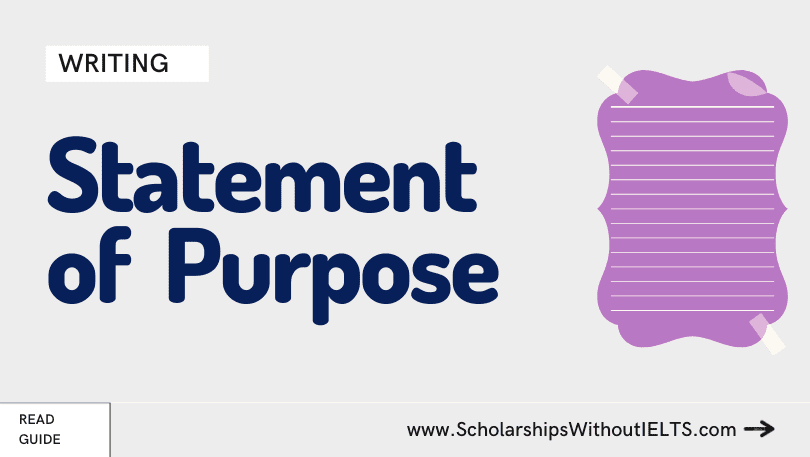Statement of Purpose (SOP) for Scholarship Applications

In most cases, a Statement of Purpose scholarship application will determine whether or not you will be securing that scholarship you are aiming for. In several universities, an SOP is a requirement, while in others, an SOP is a choice (that you should never miss out on).
The question stands, what is an SOP?
A Statement of Purpose (SOP) for Scholarship application is an additional document that you provide to the university admission committee with your university application. An SOP helps the admission department to get familiar with you as a person, and to know of why do you want to study in a degree program at their University, and how you will utilize your degree, your past performances, achievements, and excellence in the chosen field, etc.
In short words, an SOP defines your purpose of admission and why you want a scholarship. The panel decides whether you are a compatible and deserving candidate for the scholarship. An SOP is an essential document that requires full attention and creativity. A thoughtfully written SOP will secure you that scholarship. A sloppy SOP will get your scholarship application slid under the desk. Therefore, you need to make that Statement of Purpose engaging, enjoyable, and fascinating.
Is Statement Of Purpose For University And For Scholarship The Same Thing?
The two applications are very different from one another. Statement of Purpose for Scholarship is much more detailed and needs to be much more thrilling and convincing than SOP for admission. Additionally, the format for SOP for scholarship has an entirely different format as well.
Format of SOP for Scholarship Application
Your university requires several documents. All of these documents are just a big packet of facts about you and your academic achievements. An SOP is the only application that allows the admission committee to dive into your personality, your perspectives, and your enthusiasm to be studying your field of choice. So keep in mind you can woo your admission committee with your SOP, so be as charming and convincing as possible.
But how do I write an SOP for a Scholarship? Here is a brief guide on how to write an SOP essay.
#1 Structure.
An SOP application for a scholarship is basically an essay. Make sure to include introductory, body, and conclusive paragraphs. Your body paragraphs can vary from three to five paragraphs.
#2 Word limit.
There’s never a definite word limit for an SOP application. Word limit is usually given by the university. Usually, it is between 800-1000 words, so if the university has not specified a word limit, let your application not be longer than 1000 words.
#3 Font.
Use a standard theme font, font size, and character spacing. Standard font themes are Times New Roman, Calibri, and Arial, with a font size varying from 10-12 for the body, and headings must be bold. The size can be from 14-18.
#4 Try to go through as many samples as possible.
To better understand the preferred format by the university, try to go through successful application samples if the university has published any. Assess what is common and try to use the same approach.
What to include in the SOP.
While composing the SOP application, make sure you answer the following questions.
- Why are you applying to the respective university?
- What program are you studying and why that program?
- Why do you deserve the scholarship?
- What will you do with the scholarship?
- Why are you better than other candidates?
- What will you do in the future?
Some noteworthy tips to remember while writing an SOP for a scholarship.
Everyone follows the same pattern for the Statement of Purpose application. You need to stand out to catch the attention of the reader. Here are a few tips for writing an impressive SOP.
- Write an attention-grabbing introductory paragraph.
- Draw out an outline of the application.
- Use advanced but not too complex English.
- Use transitioning sentences and paragraphs.
- Build a persuasive and strong case.
- Do not be repetitive.
- Mention past achievements.
- Be positive and enthusiastic.
- Do not write about one fact too much. Hop onto the next.
- Be mindful of the word limit.
- Keep it intriguing.
- MUST double-check your application for spelling and grammatical errors.